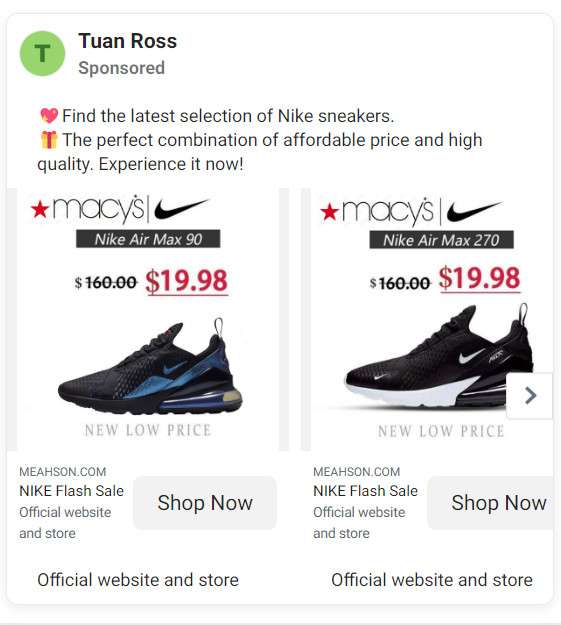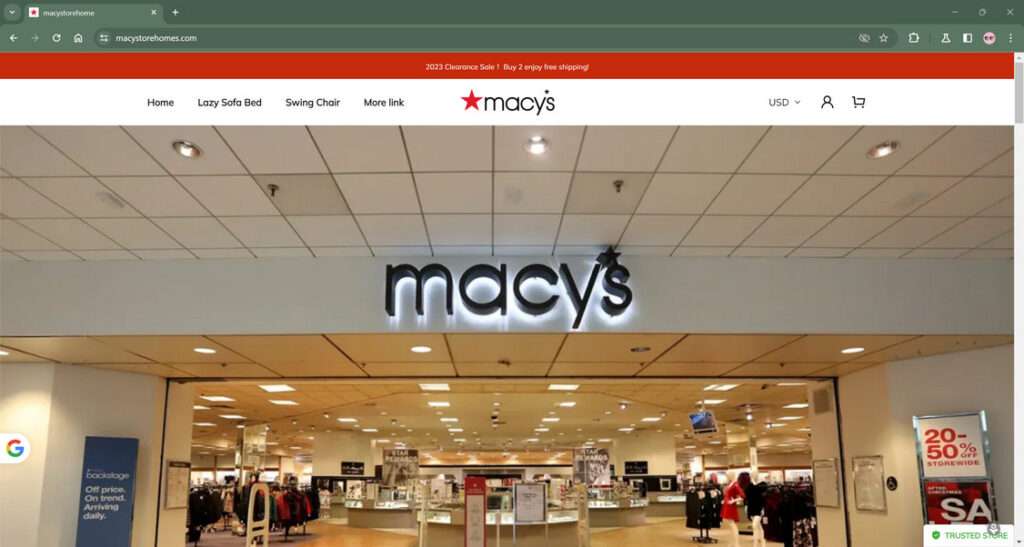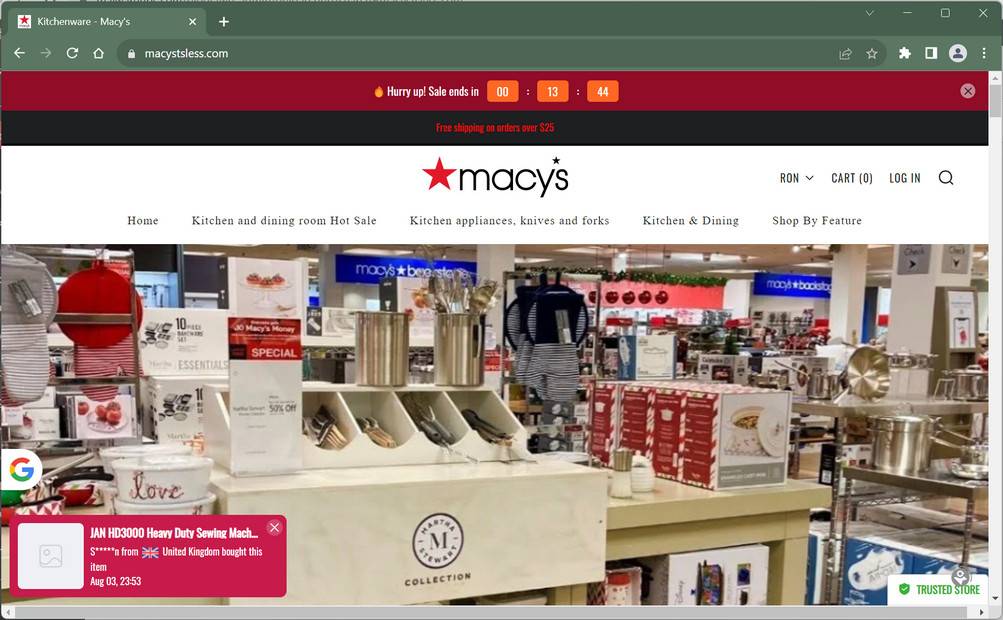Sneakerheads beware – a crafty social media scam promising $19.98 Nike shoes via viral Macy’s sales is duping eager bargain hunters. Too good to be true? You bet. This article will expose the dirty tricks used to manipulate shoppers through compelling but counterfeit deals.
- Overview of the Deceptive $19.98 Macy’s Nike Sneakers Sales Scam Duping Social Media Users
- How the Deceptive $19.98 Macy’s Nike Sneakers Sales Scam Works
- How to Identify the Fraudulent Sites Promoting the Fake Macy’s Nike Sales
- Identifying This Scam on Social Media Platforms
- What to Do If You’ve Fallen Victim to the Fake Macy’s Nike Sales Scam
- Frequently Asked Questions About the Viral $19.98 Macy’s Nike Sales Scam
- The Bottom Line on the Viral Fake Macy’s Nike Sales Scams
Savvy scammers are leveraging the credibility of major brands like Macy’s and Nike combined with targeted ads on Facebook, Instagram and TikTok. Their bait? Unbelievable rock-bottom prices on highly coveted kicks like Jordans and Dunks – marked down over 90% off retail. But the deals are completely bogus.
Clicking these ads sends victims not to Macys.com, but rather directly into clever traps meticulously designed by fraudsters to steal identities and payment information. Make no mistake – the sites are elaborate shams aiming to scam, not sell. This intriguing but alarming scam reveals the powers of perception – and deception.
Learn how these opportunists exploit our inner frugal fashionista through psychological tricks and precise counterfeiting. Their weapon of choice? Social media ads offering exactly what we covet most – enviable styles at irresistible savings. But informed is armed, so let’s unveil their cunning tactics targeting those chasing deals and dimes. Welcome to the wild world of cybercrime meets cyber fashion.



Overview of the Deceptive $19.98 Macy’s Nike Sneakers Sales Scam Duping Social Media Users
A cunning social media scam promoting unbelievable deals on Nike shoes has emerged, leveraging Macy’s trusted brand image to dupe bargain hunters. Sponsored posts on Facebook, Instagram and TikTok lure victims with eye-catching slogans like “Macy’s Blowout Sale – Nike Shoes Only $19.98!” and “Going Out of Business Sale! Nike Jordans Just $19.98 at Macy’s!”.
Clicking these compelling ads leads not to Macys.com, but rather to sophisticated fake sites carefully mimicking the real Macy’s online store. Unbeknownst to visitors, these fraudulent sites are elaborate traps set by cybercriminals to harvest user payment and personal data.
After adding items to their cart and entering credit card and contact information to “checkout”, victims soon realize it was all a scam when no order confirmation or shipping notice appears. By then, it’s too late – the scammers possess their money and data.
This viral scam leverages social media advertising and exploits shopper psychology with tactics like:
- Promoting coveted shoes and apparel like Nike Jordans, Dunks and Air Force 1’s at over 90% off retail prices. For example, $160 Nike shoes discounted to just $19.98.
- Using real Macy’s branding, logos, images and website templates to create elaborate fake e-commerce sites that closely mimic the authentic Macys.com online store.
- Duping visitors into believing the absurd discounts are real limited-time promotions reserved for social media followers.
- Pressuring urgency with countdown timers and banners reading “Limited Stock!” or “Going Fast!” to compel victims to purchase immediately without closer inspection.
- Making the scam go viral by broadly targeting ads using interests like “sneaker deals”, “Nike shoes”, “Jordans” and other terms bargain hunters follow.
- Disabling site features like customer reviews that would expose the scam, and burying contact info to avoid fraud reports.
Once users submit their payment card and personal information, the data is stolen and no items ever ship out. The victim realizes they’ve been scammed when no confirmation or shipping notice appears. At that point the damage is already done, as scammers immediately put stolen details to use making fraudulent purchases online or sell the data on the dark web.
With near-perfect website spoofing and enticing ads run rampantly on social platforms, this scam has claimed many victims. However, understanding the deceptive tactics makes it possible to recognize the red flags and avoid getting duped.
This scam has been also investigated by Jordan Liles on his YouTube channel, where he offers a detailed video on the subject. We recommend watching his content for a comprehensive understanding of the scam. You can find his video at Jordan Liles – YouTube.
Next, let’s break down exactly how scammers carry out this scam from start to finish.
Next, let’s examine the cunning techniques used to pull off this fraudulent social media scheme.
How the Deceptive $19.98 Macy’s Nike Sneakers Sales Scam Works
This scam is complex, using social media ads and flawlessly duplicated fake Macy’s websites to trick shoppers. Here’s an in-depth look at how this ripoff works:
1. Scammers Create Eye-Catching Social Media Ads
Scammers setup social media accounts and pay to run ads on Facebook, Instagram and TikTok. The ads feature desirable brands like Nike at insanely low prices like $19.98, down from $160. This sparks attention and urgency in deal seekers.

2. The Ads Funnel Victims to Sophisticated Fake Macy’s Websites
When clicked, the social ads direct victims to elaborate fake sites mimicking the real Macy’s website. The imposter sites use Macy’s logos, images and branding to dupe visitors.


3. Visitors Browse Fake Catalogs of Deeply Discounted Macy’s Products
The fraudulent sites showcase phony Macy’s catalogs with absurdly discounted prices on coveted Nike shoes and apparel. This aims to trick visitors into believing the deals are real.
4. Users Add Items to Their Cart and Proceed to Checkout
Believing the scam sales are legitimate, victims add improbably priced items to their cart, enticed by slogans pressuring quick purchases before the discounts vanish.
5. At Checkout, Users Enter Personal and Payment Information
To finalize orders, users enter sensitive data like names, addresses, phone numbers, emails and credit card details – everything scammers want to steal.
6. No Order Confirmation Appears After Submitting Payment
No order confirmation comes after “checkout”, just vague messages to await processing. Victims realize something is wrong when no shipping confirmation appears either.
7. Follow Up Emails Go Unanswered, Exposing the Scam
Trying to contact customer service proves impossible, as all site info is fake. Emails bounce back undeliverable. Calls go unanswered. No real support exists.
8. No Items Ship Out, Only Scammers Benefit
No Nike shoes or other products ever arrive, since no legitimate retailer exists. Only scammers profit, having stolen victims’ money and sensitive personal data.
This clever scheme relies on precise website spoofing and social media ads promoting unbelievable deals that prey on shopper tendencies to be savvy bargain hunters. But armed with knowledge of the tactics used, consumers can spot the deception and avoid being manipulated by this scam.
Here is a detailed section on how to spot the fake Macy’s Nike sales scam websites:
How to Identify the Fraudulent Sites Promoting the Fake Macy’s Nike Sales
While the scam sites are sophisticated spoofs made to closely mimic the real Macys.com, a close inspection reveals many red flags exposing their fraudulent nature:
Recently Registered Domains
Rather than using the actual Macys.com URL, the sites use newly created domains often containing subtle typos or variations meant to deceive. Examples include sites like “Macys-store.com” or “Macys-shops.com”. Real Macy’s domains are generally registered many years ago.
Missing Contact Information
Unlike legitimate sites, scam sites lack working phone numbers, physical addresses and customer service contact options. At most, only fake emails may be present which lead nowhere when victims try to report the fraud.
Unrealistic Discounts Up to 90% Off
Authentic retailers very rarely offer discounts over 25-30% on premium brands like Nike shoes. Prices slashed over 90% off are a telltale indicator of a scam. Macy’s would never offer $160 Nikes for just $19.98.
Amateur Site Design and Layout
While the scam sites mimic the visual style of Macy’s, a closer look reveals sloppy design flaws. Images are often low-resolution, content appears plagiarized, and product sections lack unique details. Stolen images also frequently appear.
Suspicious Domain Registration Details
Scam sites use privacy services to hide identifying domain registration info. Legitimate businesses provide valid physical addresses and contact data.
Pressuring Sales Tactics and Countdown Timers
Tactics urging immediate purchase like countdown timers and banners reading “Almost Gone!” demonstrate the sites are not real Macy’s promotions.
Lack of Real Customer Reviews
Missing or disabled customer ratings and reviews prevent scam exposure. Authentic Macy’s listings have reviews visible.
Stay vigilant for these red flags when evaluating special sales promotions online. Take time to carefully analyze site details before providing any sensitive user information or payment data.
Identifying This Scam on Social Media Platforms
Spotting the Fake Macy’s Sales on Facebook
- Highly-targeted ads for “too good to be true” 90% off Nike deals that seem unrealistic.
- Use of pressuring slogans like “Clearance Sale!” “Today Only!” “Going Fast!”.
- Ads and pages using Macy’s logos and images without being verified official accounts.
- Links in ads and posts go to shady new domains instead of Macys.com.
- Little to no follower engagement on scam accounts and posts.
- Stolen images in posts cropped or edited to hide watermarks.
- Videos promoting the sales using AI-generated voices and stock footage spliced together.
Recognizing the Ripoff Ads on Instagram
- Targeted ads in feeds promoting Macy’s Nike deals with prices like “Just $19.98!” (down from $160 retail).
- Highly-edited photos of Nike shoes cropped to hide defects exposing them as fake listings.
- Accounts impersonating Macy’s without verification badges using the @macys handle deceptively.
- Comment sections turned off on scam posts to suppress fraud exposure.
- Links in bios and posts leading to sketchy sites designed to steal user data at checkout.
Avoiding This Scam on TikTok
- Video ads promising clearance sales on Nikes “starting at $19.98”.
- Stock videos and green screen effects made to look like authentic in-store promotions.
- Comments and stitch videos exposing the scam are deleted immediately.
- Links to fake Macy’s sites using URL shorteners to hide the suspicious domain.
- Unrealistic discounts over 90% off that the real Macy’s would never offer.
Stay alert for these red flags indicating sham social media campaigns promoting fake markdowns. Verify discounts directly with Macy’s before engaging with ads peddling unbelievable deals and urging immediate purchases. Exercise caution sharing any personal or payment details via links in suspect posts.
What to Do If You’ve Fallen Victim to the Fake Macy’s Nike Sales Scam
If you suspect you’ve been scammed by one of these fraudulent Macy’s Nike sales promotions, take these steps immediately to limit damages:
1. Contact banks and credit card companies: Report any unauthorized charges and request replacement cards. Placing initial fraud alerts can help prevent further misuse of your accounts.
2. Monitor your accounts and credit reports: Scammers may have gained enough personal information to open accounts in your name. Regularly review accounts and credit reports to identify suspicious activity.
3. Update account passwords and security questions: Change logins and security details on all your online accounts to prevent access with compromised information. Enable two-factor authentication where possible.
4. File complaints with authorities: Report the scam to agencies like the FTC, FBI, IC3, and Better Business Bureau to aid investigations. Provide details on the ads, fake websites and any losses.
5. Beware of recovery scams: Fake customer support reps may reach out claiming they can recover lost funds, then steal more money. Only work directly with real financial institutions and authorities.
6. Adjust social media privacy settings: Limit sharing of personal information on social media sites to reduce risks of identity theft. Report fake ads and accounts to platforms.
Stay vigilant for the warning signs of additional frauds trying to compound the damages. Report each scam attempt and work diligently with banks and agencies to limit financial and identity theft risks in the aftermath.
Frequently Asked Questions About the Viral $19.98 Macy’s Nike Sales Scam
1. How does the fake Macy’s Nike sales scam work?
This scam uses social media ads and fake but realistic looking sites to promote absurd discounts on Nike shoes and apparel. The ads link to sophisticated sham sites designed to steal user payment info and identities. After entering card details to “checkout”, victims find no confirmation appears and realize it was a scam.
2. What platforms are used to promote this scam?
Scammers primarily use Facebook, Instagram and TikTok ads to spread this scam. Targeted posts promise enviable discounts to lure in victims and direct them to the phony sites.
3. What red flags can help spot the fake sites?
Red flags include unbelievable 90% off deals, new domains with typos, missing contact info, fake reviews, suspicious registration details, grammatical errors, and disabled security features.
4. How are the social media ads designed to manipulate users?
The ads use desirable brands, stolen images, enticing slogans and false urgency to spark interest and prevent closer inspection. Broad targeting spreads the scam widely.
5. What happens when users try to purchase the discounted items?
After entering payment and personal info, no confirmation appears. Emails and calls go unanswered, exposing the scam. Users never receive any products.
6. What do scammers do with the data collected from victims?
Scammers immediately use stolen payment info to make fraudulent purchases online. Personal data like names, emails and addresses are sold on black markets.
7. What should I do if I suspect I was scammed?
Contact banks to block charges and monitor accounts. File fraud reports with agencies like the FTC and IC3. Change passwords and enable two-factor authentication. Watch for recovery scams.
8. How can I avoid falling for these viral Nike sales scams?
Be skeptical of offers too good to be true. Verify discounts on retailer sites. Inspect sites carefully before providing info. Avoid pressuring ads urging immediate purchase.
9. Are these scams only happening on Macy’s and Nike brands?
No, scammers use this same scam tactic with other major retailers and brands. Always thoroughly validate advertised deals before engaging.
10. How can I report these fake sales promotions or accounts?
Submit details on the scam ads, sites and social media accounts to authorities and platforms to aid fraud investigations. Legitimate retailers also want to be aware of spoof sites misusing their branding.
Carefully evaluating deals and using caution online protects shoppers. But knowledge of how these scams operate makes it possible to recognize and report them when encountered. Don’t let scammers trick eager bargain hunters into compromising hard-earned money and identities.
The Bottom Line on the Viral Fake Macy’s Nike Sales Scams
This social media scam leverages Macy’s brand recognition and techniques like fake discounts, pressuring ads and spoofed websites to hook eager deal seekers. But armed with awareness of the deception tactics, consumers can recognize the ruse before getting lured into the traps. Verify discounts directly with retailers. Inspect sites carefully prior to providing payment details or personal data. Avoid unrealistic limited-time deals urging immediate purchases without proper validation. Report suspicious accounts and ads. Becoming an informed shopper is the best way to outsmart these frauds aiming to fool consumers online. Don’t let scammers steal hard-earned money or compromise identities through viral social media sales scams.



